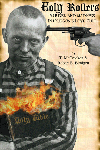Holy Rollers: Murder and Madness in Oregon's Love Cult
by T. McCracken and Robert B. Blodgett
CHAPTER TWENTY-ONE
Two Other Murders
***
MURDER KEPT FROM MITCHELL JURORS
Headline, Portland's Evening Telegram, July 9 1906
***
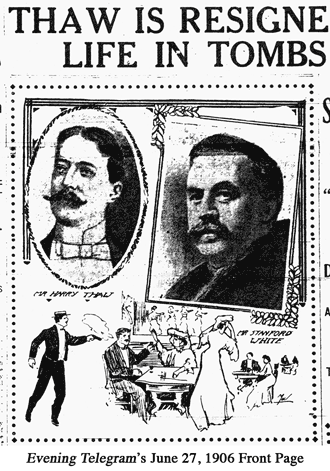
Compounding matters, there was yet another murder that people all over Seattle were talking about. On the first day of George’s trial, stories about his case shared the nation’s front pages with stories about young Harry Thaw’s murdering Stanford White in cold blood.
What is happening to today’s youth? people were wondering.
On June 25th much of New York’s high society was packed into Madison Square Garden for the opening of a new musical, Mamzelle Champagne. The show was so dull that people left early or milled about chatting with friends in the roof garden. Suddenly Harry Thaw, in front of dozens of witnesses, pulled out a pistol and shot Stanford White three times. White lay dead in a pool of blood, his face blackened and unrecognizable from powder burns.
“Good God, Harry!” Harry’s wife, Evelyn, cried. “What have you done?”
“All right, dearie,” he calmly said. “I have probably saved your life.”
As screaming women fought their way to the exit, the manager tried to restore order by jumping up on a table and shouting: “Go on playing! Bring on the chorus!”
“He deserved it,” Harry said to the arresting officer. “I can prove it. He ruined my wife [‘life,’ some thought he said].”
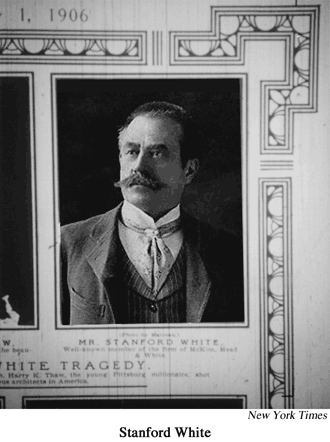 At the time Harry’s mother,
Mrs. William Thaw, was in England visiting her daughter, the Countess of
Yarmouth. When she heard about the shooting, she announced that she was
prepared to pay a million dollars to save her son’s life--no need to post signs
around town requesting donations to assist young Thaw. To represent Harry, Mrs.
Thaw hired “the Napoleon of the Western Bar,” Delphin
Michael Delmas, born in France and now an attorney from San Francisco. Described
to be a man “short in stature but mighty in voice,” he had a record of nineteen
acquittals in nineteen murder cases.
At the time Harry’s mother,
Mrs. William Thaw, was in England visiting her daughter, the Countess of
Yarmouth. When she heard about the shooting, she announced that she was
prepared to pay a million dollars to save her son’s life--no need to post signs
around town requesting donations to assist young Thaw. To represent Harry, Mrs.
Thaw hired “the Napoleon of the Western Bar,” Delphin
Michael Delmas, born in France and now an attorney from San Francisco. Described
to be a man “short in stature but mighty in voice,” he had a record of nineteen
acquittals in nineteen murder cases.
Stanford White, the victim, fifty-two, a big man with red hair and a big moustache, was at the time America’s most distinguished architect. One of his most famous creations was the building he died in, Madison Square Garden. Although married, he spent much of his time in the company of young women, including Harry Thaw’s wife, Evelyn Nesbit. And he didn’t just keep her company. White, Harry said, had been seducing her since she was a child.
“He seemed very kind and fatherly,” Evelyn said of White. “He always treated me just like a father except in the way he took advantage of me. Outside of this one awful part of his life he was very nice, very kind ... . Outside of that one terrible thing Stanford White was a very grand man.”
Outside of that one terrible thing Stanford White
was a very grand man? Was Evelyn insane? Then again, was it any odder than
Esther Mitchell thinking her seducer, Edmund Creffield, was the Second Savior?
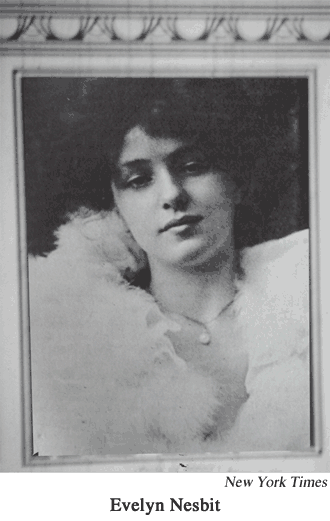
Like Esther Mitchell, Evelyn Nesbit first met her paramour when she was a teenager. It was in 1901 when she was sixteen and in the chorus of the musical. She was a beauty with an oval face, copper curls, hazel eyes, a voluptuous mouth, and a splendid figure, one of the girls that Gibson men in gray cutaways and top hats asked: “Tell me, pretty maiden, Are there any more at home like you?” To which the girls demurely replied: “There are a few, kind sir, but simple girls, and proper too.”
White befriended not only Evelyn, but her mother too. When Evelyn’s mother went to visit friends in Pittsburgh, White offered to care for Evelyn. “You may leave her with me in perfect safety,” he assured her mother. But as soon as White was alone with Evelyn in his house, he seduced her after giving her champagne.
During Harry Thaw’s trial Evelyn testified that she had “told Harry” about this seduction. As in George Mitchell’s trial, having a witness testify to telling the defendant a story was the only way of getting the murder victim’s foul deeds before the jury. It was not hearsay because it was not offered as evidence of White’s seductions, but as evidence of Harry’s state of mind when he killed White.
He [White] came to me and told me to finish my champagne [Evelyn said], which I did, and I don’t know whether it was a minute after or two minutes after, but a pounding began in my ears, then the whole room seemed to go around ... .
Then I woke up, all my clothes were pulled off of me, and I was in bed. I sat up in the bed, and started to scream. Mr. White was there nude ... . There were mirrors all around the bed. There were mirrors on the side of the wall and on top. Then I screamed, and he came over and asked me to please keep quiet, that I must not make so much noise. He said, “It is all over, it is all over.” Then I screamed, “Oh, no!” ...
He said that everything was all right ... . He said everybody did those things; that all people were doing those things, that that is all people were for, all they lived for ... . And then I looked at him and said, Does everybody you know do these things? And he said, “Yes.” And the first thing I could think of was the Florodora sextette. I asked him if the sextette did these things. He sat down and started to laugh, and laughed and laughed and laughed.
Evelyn testified that after she had “told Harry” this story, it preyed on his mind constantly until, in an insane “brainstorm,” he decided to kill White.
“No jury on earth will send me to the chair, no matter what I have done or what I have been, for killing the man who defamed my wife,” Harry said. “That is the unwritten law made by men themselves, and upon its virtue I will stake my life.”
Harry Thaw, thirty-four, hoped to be viewed as a hero, as George Mitchell was. On the surface, their cases seemed similar. Both of them had killed men who had committed reprehensible acts--Harry a man who had done “those things” with most of the Florodora sextette, and George a man who had done “those things” with most of Corvallis’s Salvation Army garrison.
But Harry Thaw was never viewed as a hero, for he was almost as vile as his victim. Harry, son of William Thaw, a nouveau riche Pittsburgh railroad and coke magnate, had been in one notorious escapade after another before this. His studies at Harvard focused almost solely on the finer points of poker, and he had once lost $40,000 in a single game. On another occasion he threw a party in Paris at which his guests were the city’s leading whores.
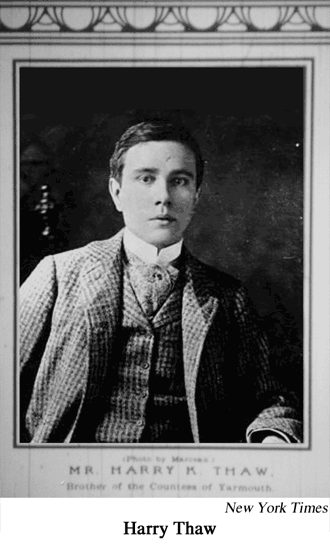
When his father died, Harry was given an allowance of $200 a month until such time as he showed himself responsible enough to handle his $5 million share of a $40 million estate. His doting mother, however, enabled him to resume the playboy life he had enjoyed by upping his allowance to $80,000 a year.
Before their marriage, Harry traveled with Evelyn through Europe. After their travels, Evelyn went to a celebrated shady lawyer, Abe Hummel, and swore out an affidavit about Harry mistreating her in a castle he rented in Austria:
The said Thaw said he wished to tell me something, and asked me to step into my bedroom [Evelyn said in her affidavit]. I entered the room, when the said Thaw, without any provocation, grasped me by the throat and tore the bathrobe from my body, leaving me entirely nude except for my slippers. I saw by his face that the said Thaw was in a terrific, excited condition, and I was terrorized. His eyes were glaring and he had in his right hand a cowhide whip. He seized hold of me and threw me on the bed. I was powerless and attempted to scream, but the said Thaw placed his fingers in my mouth and tried to choke me. He then without any provocation, and without the slightest reason, began to inflict on me several severe and violent blows with the cowhide whip. So brutally did he assault me that my skin was cut and bruised. I besought him to desist, but he refused. I was so exhausted that I shouted and cried. He stopped every minute or so to rest, and then renewed his attack upon me, which he continued for about seven minutes.
He acted like a demented man. I was absolutely in fear of my life ... .
It was nearly three weeks before I was sufficiently recovered to be able to get out of my bed and walk ... .
One day my maid was in my room taking things out of the drawers and packing them away. I found a little silver box, oblong in shape, and about two and a half inches long, containing a hypodermic syringe and some other small utensils ... . I realized then for the first time, that the said Thaw was addicted to the cocaine habit ... .
During this entire period, while I was in this condition of non-resistance the said Thaw entered my bed and, without any consent, repeatedly wronged me. I reproved the said Thaw for his conduct, but he compelled me to submit thereto, threatening to beat and kill me if I did not do so.
Evelyn Nesbit may have looked like an innocent--much like Esther Mitchell--a young girl who was taken advantage of by unscrupulous men, but Evelyn wasn’t a complete innocent. After having the affidavit drawn, Evelyn, at the suggestion of Stanford White, coerced Harry into marrying her by threatening to show the document to the authorities and have him charged him with “corrupting a minor.”
Why did she want to marry “the said Thaw,” a man she knew was a paranoid sadist? For one of the oldest reasons: greed. She wanted wealth and a position in society. “This is a case where a woman lay like a tigress between two men, egging them on,” said New York’s district attorney, William Travers Jerome.
If George’s jury now found out that a third young man in as many months had publicly murdered someone, it would be very hard for them in good conscience to acquit George.
“A desperate effort may be made tomorrow by the prosecution to get some inkling of the murder of Judge George Emory before the jury,” the Oregonian commented. “Some chance remark, some slight intimation or else a bald reference to the tragedy may be given. It is a subterfuge and a trick, and one likely to result in punishment for contempt of court, but the attorneys representing the state may attempt to influence the jury by letting the arbiters of Mitchell’s fate know that another man has been shot down in Seattle by a youth who will plead insanity.”
The prosecution promised they would make no such attempt, and Judge Frater did his best to prevent the jurors from hearing about the latest murder from other sources. He went so far as to instruct the bailiffs to take the jurors to and from their meals by a new route so they wouldn’t see the courthouse flag flying at half-mast.
Morris stated that in order to hasten matters and make it possible to adjourn court on the day of Emory’s funeral, the defense would waive the right to put a number of witnesses on the stand.
That settled, the trial proceeded--until the cholera epidemic broke out among the jurors.
***
Save yourselves from this untoward generation.
Acts 2:40
***
Some of the newspaper articles that are sources for this chapter:
July, 1906: Two More Page One Murders
***
Editorial Calling for Gun Control in 1906
***
Chapters from
Holy Rollers: Murder & Madness in Oregon's Love Cult
Part 1: The Seduction
Chapter 1: Trust Me, Brothers And Sisters
(Life Before Creffield [B.C.])
Chapter 2: God, Save Us From Compromising Preachers
(Creffield's Preachings)
Chapter 3: The Flock
(Profiles of the Holy Rollers Were)
Chapter 4: The Holy Rollers
(Things Start to Get Wild on on Kiger Island)
Chapter 5: Housecleaning
(There's a Sacrificial Bonfire)
Chapter 6: Community Concerns
(Officers Visit)
Chapter 7: Esther, The Chosen One
(Creffield Plans to Marry 16-Year- Old)
Chapter 8: Tar and Feathers
(The Men of Corvallis Act)
Chapter 9: Sane People Don’t Go Bareheaded
(Holy Rollers are Committed to the Asylum)
Chapter 10: More Beast Than Man
( Creffield is Arrested)
Chapter 11: God Will Plead Creffield's Case
(Creffield in Court)
Chapter 12: Scandal
(Shocking Testimony at the Trial)
Chapter 13: Calm Before the Storm
(The Holy Rollers Resume their Lives)
Chapter 14: Giving Up The Ghost
(Men are Gunning for Creffield)
Part Two: The People V. Creffield
Chapter 16: The Widow Creffield
Chapter 19: An Inherited Streak of Insanity
Part Three: The Madness
Chapter 23: Seeking Reconciliation
Chapter 24: Another Holy Roller Page One Murder
Chapter 25: What Can Papa Do For You?
Chapter 26: Human Life is Too Cheap In This Community
Chapter 30: The Final Chapter
(What Happened to Everyone Afterwards)
The Epilogue
(Heaven's Gate)
Newspaper Articles about Creffield & the Holy Rollers
1897-1903: B.C. (Before Creffield)
October to December 1903:Holy Rollers Burn Furniture & Pets
January to March, 1904: Holy Rollers Tarred and Feathered
April to June 1904: Holy Rollers are Committed to the Asylum
July 1904: Creffield is Found & Arrested
September 1904: Creffield's Trial
April 1906: Men are Gunning For Creffield
May 1906: Creffield is Murdered, Murderer is Considered a Hero
May 1906: Holy Rollers Found Starving Near Heceta Head
June 1906: George Mitchell's Trial Begins
July 1906: Hurt Testifies of Debauched Wife and Debased Sisters
July 1906: Esther Mitchell Kills Her Brother
August to October 1906: Seattle Prepares for another Big Trial
November 1906: Maud Hurt Creffield Commits Suicide
April 1909-August 1914: Esther Leaves the Asylum
1953 Stewart Holbrook's Murder Without Tears
1951Startling Detective Magazine, Nemesis of the Nudist High Priest
***
